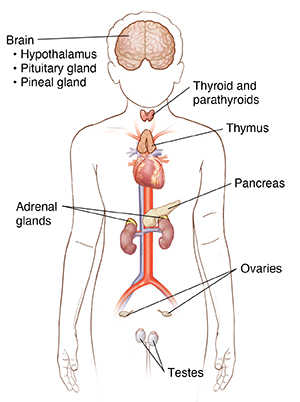A
B
C
D
E
F
G
H
I
J
K
L
M
N
O
P
Q
R
S
T
U
V
W
X
Y
Z
Topic IndexLibrary Index
Click a letter to see a list of conditions beginning with that letter.
Click 'Topic Index' to return to the index for the current topic.
Click 'Library Index' to return to the listing of all topics.
Anatomy of the Endocrine System in Children

These are parts of the endocrine system:
-
Hypothalamus. This gland is in the brain. It secretes hormones that stimulate or suppress the release of hormones in the pituitary gland. It also controls water balance, sleep, temperature, appetite, mood, and blood pressure.
-
Pineal body. The pineal body is in the brain. It sits below the corpus callosum, in the middle of the brain. It makes the hormone melatonin. This hormone controls the sleep cycle. The pineal body may also be part of the timing of puberty.
-
Pituitary gland. This gland is at the base of the brain. It's called the "master gland." It's about the size of a pea. This gland secretes many hormones that control many functions of the other endocrine glands.
-
Thyroid and parathyroids. The thyroid gland and parathyroid glands are in front of the neck, below the larynx (voice box). The thyroid controls the body's metabolism. The parathyroid glands control the body's calcium and phosphorus balance.
-
Thymus. The thymus is in the upper part of the chest. It makes white blood cells, called T cells, and secretes a hormone that helps these T cells mature and function. These cells fight infections and destroy abnormal cells.
-
Adrenal gland. There are 2 adrenal glands. Each gland sits on top of each kidney. They work with the hypothalamus and pituitary gland to make cortisol (called the stress hormone) and other hormones important for normal metabolism.
-
Pancreas. The pancreas is behind the stomach. It makes hormones for digestion and metabolism. These include the hormones insulin and glucagon. Both control blood sugar levels.
-
Ovaries. Females have 2 ovaries. There is 1 ovary on each side of the female's uterus, below the opening of the fallopian tubes. The ovaries contain egg cells for reproduction. They also make estrogen and progesterone.
-
Testes. Males have 2 testicles (testes). They are located in a pouch (scrotum) that hangs outside the groin. The testes make testosterone and sperm.
Online Medical Reviewer:
Raymond Kent Turley BSN MSN RN
Online Medical Reviewer:
Ricardo Rafael Correa Marquez MD
Online Medical Reviewer:
Sabrina Felson MD
Date Last Reviewed:
1/1/2023
© 2000-2025 The StayWell Company, LLC. All rights reserved. This information is not intended as a substitute for professional medical care. Always follow your healthcare professional's instructions.